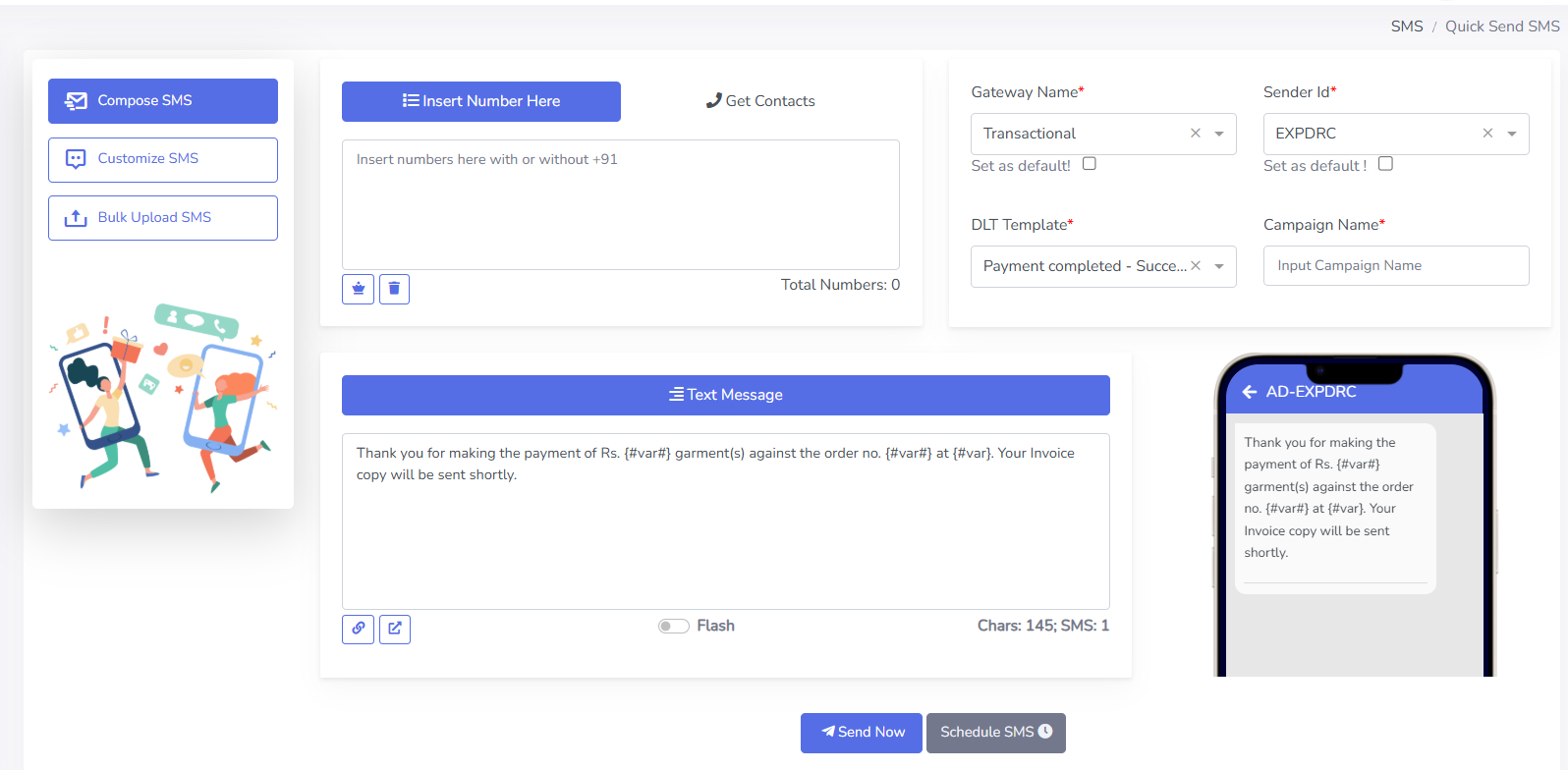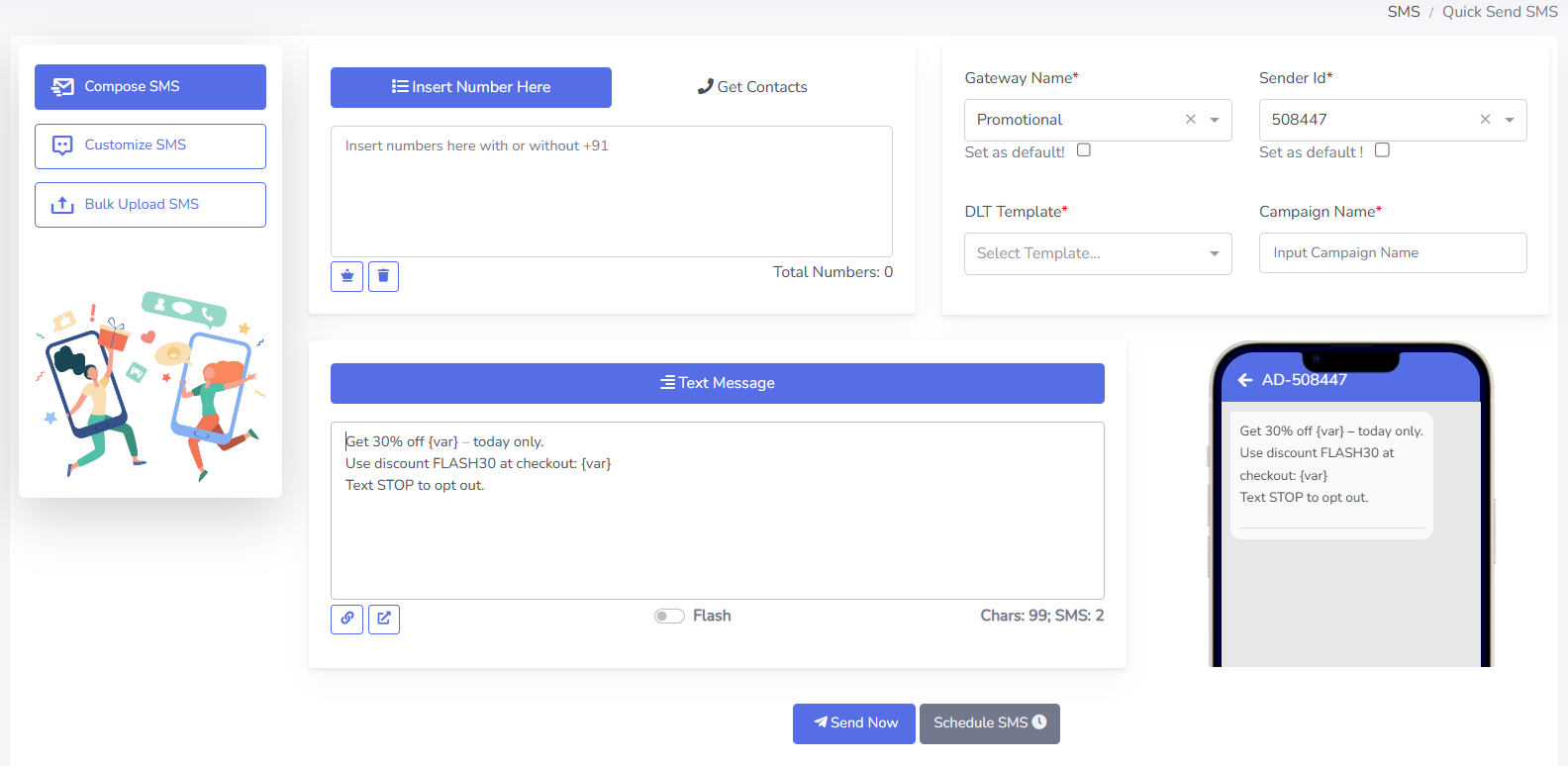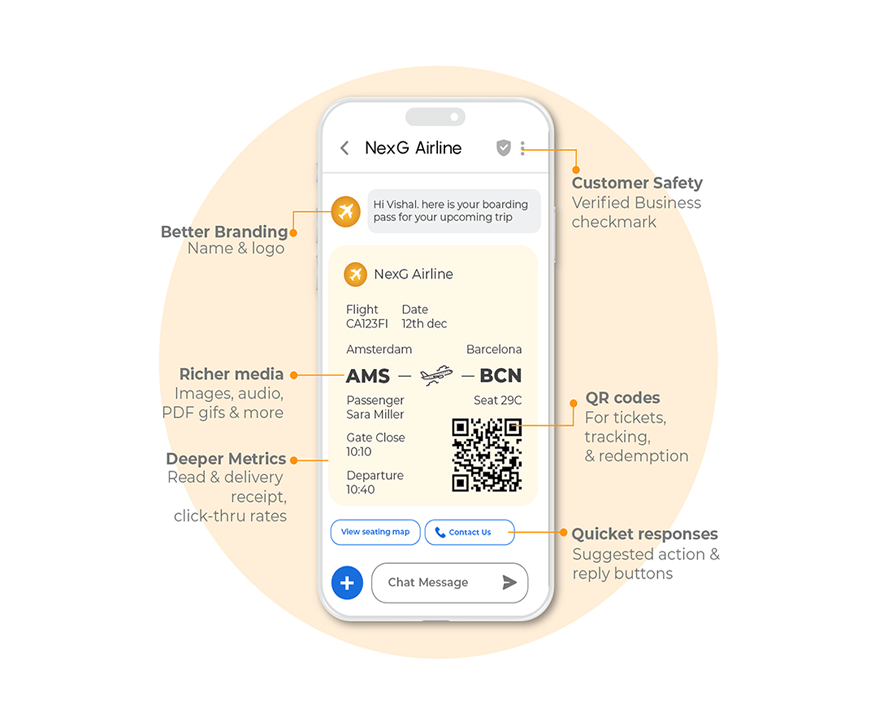Broadcast SMS Transactional Messages
Transactional SMS are automated text messages sent by businesses to communicate essential, non-promotional information to customers, typically triggered by specific actions or events. These messages are used for things like order confirmations, shipping updates, and one-time password (OTP) verification.
Key Characteristics of Transactional SMS:
- Automated: They are typically triggered by a specific event or action, ensuring timely delivery.
- Non-Promotional: The content focuses on providing information and updates, not on promoting products or services.
- Time-Sensitive: They are often sent at crucial moments to keep customers informed and facilitate the customer journey.
- Customer-Focused: The content is relevant to the customer's specific transaction or interaction with the business.
* Improved Customer Experience
* Increased Efficiency
* Reduced Support Requests
* Enhanced Trust
Broadcast SMS Promotional Messages
Promotional SMS, also known as promotional text messages, are short message service (SMS) messages used by businesses to promote products, services, or events to their audience. They are a direct and efficient way to engage customers and drive sales by informing them about special offers, discounts, and other promotional activities.
Here's a more detailed look at promotional SMS:
- Marketing Tool: Promotional SMS is a marketing strategy where businesses send text messages to promote their offerings.
- Informative and Engaging: They aim to keep customers informed about the latest deals, discounts, and events, encouraging them to take action, such as visiting a website or making a purchase.
- Direct Communication: SMS messages offer a direct and immediate way to reach customers on their mobile devices, making them a powerful tool for immediate engagement.
- Urgency and Action: They often create a sense of urgency and encourage immediate action by highlighting limited-time offers and calls to action.
* High Open Rates
* Direct Engagement
* Cost-Effective * Personalized Messaging
Broadcast RCS (Rich Communication Services) Messages
Rich Communication Services (RCS) is a messaging standard that allows users to send texts, photos, videos, and more. RCS is available on Android and some iPhones.
- Features: Send high-resolution photos, videos, and files.
- Read receipts: Shows when someone has read or received your message.
- Typing indicators: Shows when the other person is typing a response.
- Security: End-to-end encryption for safe communication with other Google Messages users.
- Choose a DLT Provider: Select an authorized DLT provider (e.g., Jio, Airtel, BSNL, MTNL) to register with.
- Provide Business Information: You'll need to provide details about your business, including its legal name, address, contact information, and KYC documents (PAN, GST, etc.).
- Choose Entity Type: You can register as either a Principal Entity (enterprise) or a Telemarketer.
- Complete Registration: Fill out the required forms and submit them to the DLT provider.
- Verification: The DLT provider will verify your information and documents.
- Get Entity ID: Once verified, you'll receive a unique Entity ID.
- Choose Sender ID Type: You can choose between alpha-numeric (letters and numbers) or numeric headers.
- Provide Business Information: You'll need to provide details about your business, including its legal name, address, contact information, and KYC documents (PAN, GST, etc.).
- Choose Entity Type: You can register as either a Principal Entity (enterprise) or a Telemarketer.
- Submit Header Requests: Provide your preferred sender ID to the DLT provider.
- Justification: You may need to justify your chosen header and provide supporting documentation.
- Approval: The DLT provider will review your header request and, if approved, assign it to your entity.
- Choose Template Type: Select the appropriate template type based on the purpose of your SMS (Promotional, Transactional, Service Explicit, or Service Implicit).
- Create Template: Write your SMS message template, including placeholders for variable data.
- Submit for Approval: Submit the template for review and approval by the DLT provider.
- Consent Template (for Promotional and Service Explicit): If you are sending promotional or service explicit messages, you'll also need to register a consent template.
- Consent ID: Ensure you select the appropriate Consent ID for your chosen template type.
- Approval: The DLT provider will review your header request and, if approved, assign it to your entity.
- Follow Provider Instructions: Each DLT provider may have slightly different requirements and procedures.
- Update Profile: Once your entity, headers, and templates are approved, update your profile on your DLT provider's portal.
- Prepare for SMS Sending: After successful registration, you can start sending bulk SMS messages using the approved details.
To enable RCS on an Android phone:
1. Open Google Messages
2. Tap your profile picture or icon
3. Tap Messages settings
4. Tap RCS chats
5. Turn RCS chats on
How can SMS be integrated ?
To send bulk SMS messages in India, you need to register with an authorized Distributed Ledger Technology (DLT) provider and follow the registration process outlined by the Telecom Regulatory Authority of India (TRAI). This involves registering as an entity, registering headers (sender IDs), and registering your message templates.
Here's a more detailed breakdown of the DLT registration process:



